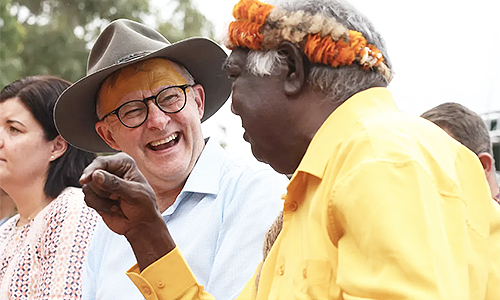The number of different post-mortems for the failure of the federal LNP may well soon outnumber the sands on Nine Mile Beach near where I live. At the risk of adding to the sandstorm, I suggest that if the LNP is to go through a process of self-understanding (which will be necessary prior to any discussions about strategies), then they could use, or should use, the six moral value foundations that Haidt outlined in The Righteous Mind: Why good people are divided by politics and religion.
I suggest the starting point for understanding the LNP’s loss of a centre is that they do not know what moral values they represent, and thus they cannot articulate why their policies are deeply good. The LNP needs a language to discuss and review this. Understanding ‘progressivism’ is a start, because a wet Liberal is closer to a progressive Laborite than one who is a ‘conservator’ (to use a Roger Scruton term). But as Louise Perry reminds us, progressivism carries with it certain ‘priors’, or assumptions about human society. One version of these beliefs is that what has gone before in our social history needs replacing. Likewise, the role of being a progressive is to therefore take down the institutions and traditions of the past and rebuild those social customs towards a better future that is more just. Such liberation is believed to rescue people from oppression or harm. Their actions are believed to create a fairer society in the face of the cheating of the oppressors. This includes releasing ‘Mother Earth’ from her oppression from the industrialists.
The language used above to describe this progressivism is intentional and represents some of Haidt’s moral values formation constructs. The three pairings used in the description of progressivism above sit about 80 per cent of the time (on average, in Haidt’s work) with those of the ‘Left’. However, what we are increasingly seeing is that such progressivist thinking is not necessarily constrained to that group. Liberals can be more economically cautious, but still morally progressive in many other aspects of life – e.g. climate alarmism, sexual identity, and welfare relief instead of work incentivisation (the last one was dominant during Covid on the Left and with many on the Right). That is, these three moral values of care over harm, liberty against oppression, and fairness instead of injustice can be common ground across the political spectrum.
So wherein can one find difference? In Haidt’s framework, it is in the belief in the other three moral values – sanctity against degradation, loyalty rather than betrayal, and respect for authority instead of subverting the established patterns of delegated responsibilities. He found that those on the Right of politics were 80 per cent more likely to give credence to the whole six, whereas those on the Left could only envision the common three for 80 per cent of the time.
This is where the LNP needs to sit and think. If they want to be the party that Menzies described, then they need to demonstrate commitment to all six moral values. That means they need to find ways of communicating that commitment in a manner that the community can relate to. For example, which moral value or values relate to not devaluing the worth of our money? What value or values relate to being much more economically sensible about energy supply – both its reliability and costing? What value or values relate to freedom of speech, conscience and religion? And so on.
My great concern is whether there are enough in leadership within the LNP that actually believe in sanctity of life, and its attendant values of loyalty and respect for authority. What in their backgrounds might lead them to such commitments? I am not sure.
Another concern I have is the naïve comment I am hearing that ‘religion has no place in politics’. That begs the question, how can one determine the nature of the common good without being self-aware of one’s most basic beliefs? We all put our faith in something, whether it be a religion or ideology. As a number of social researchers have been describing for at least the last 20 years, what we consider essential elements of ‘good society’ cannot be divorced from Christian history. Other faiths have significantly different social trajectories. So does materialistic scientism.
My pessimistic side says we are at that stage in Animal Farm where the worker animals are believing what the pigs are saying and writing, because they think it will be a better life for all. In forgetting their origins, they cannot see their present clearly.
So, what kind of people will be in leadership at the LNP? Do they want to be the elite piggies who join the exclusive meal with the other elites on the other side? Or do they want to be those who remember that ‘the common good’ embraces more than the three moral values that claim progressivism, but when used on their own, can too often lead to deconstructivism… On what basis will the LNP determine the value of human life per se, and find a message of human hope rather than animal comfort? Time will tell whether we sink further into the mud or whether we rediscover those aspects of human life that preserve our humanity and that illuminate the joy of community.









